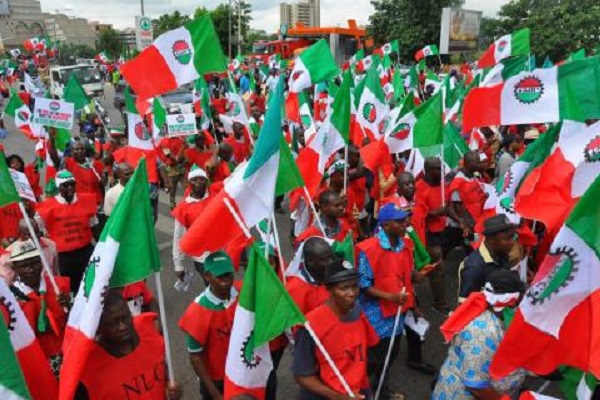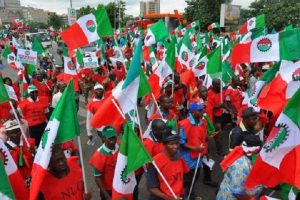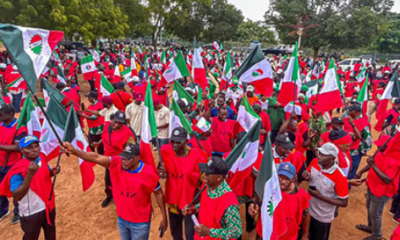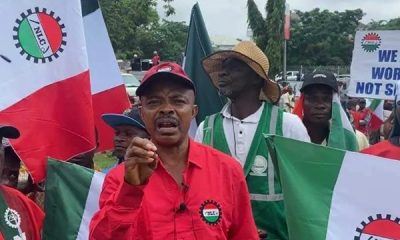Business
Employers Reject NLC’s Plan To ‘Shut Down Economy

Employers Reject NLC’s Plan To ‘Shut Down Economy
The proposed strike by the Nigerian Labour Congress (NLC)will be counter-productive if it goes ahead, private employers of labour cautioned yesterday.
According to them, the NLC should seek better opportunities for its members to cushion subsidy removal pain through dialogue with the government.
Early in the month, NLC President Joe Ajaero called out workers on a two-day warning strike, but it attracted mixed compliance on September 5 and 6.
Announcing the warning strike, Ajaero, who shunned a meeting called by Labour Minister Simon Lalong, said a “total shutdown of the economy” would follow in 14 days unless the government reversed the pump price of petrol to pre-May 29, among other reasons.
The Trade Union Congress (TUC) which declined to join the NLC for the warning strike opted for a dialogue with the government within two weeks.
In a September 8 letter to the government, the TUC said it is expecting a response from the government on its proposals.
The NLC has, however, opted to go ahead with its plan to mobilise workers for an indefinite strike.
But, a former Vice President of the NLC Comrade Issa Aremu said the industrial action is preventable.
Aremu, who is Director General of Michael Imoudu National Institute for Labour Studies (MINILS) said: “Strikes are just the means not to an end. The end is improved welfare for working men and women at these challenging times.
“I know that President Tinubu is concerned about the plight of all. His quotable quote is ‘let’s the poor breath.’
Aremu said Lalong has demonstrated commitment to dialogue with NLC and TUC.
He stressed: “Strikes are, therefore, preventable. I think both government and organized labor will soon find a common ground.
“Strike is certainly not inevitable, indeed it is preventable but rewarding negotiations and compromises by the two parties.”
The Director-General of the Nigerian Employers Consultative Association (NECA), Mr. Adewale-Smart Oyerinde, who was featured on a Television programme last night, said the proposed strike will be counter-productive, adding that it will hurt employers and employees.
The NECA boss, who applauded the Federal Government for the steps taken so far, however, said there was a need for the government to do more.
He said: “The approval of N5billion to each state is a step because if the money is well spent in a state economy, it will trigger some level of consumption, which will also go back into production.
“We are also aware that the government is sharing rice. But, these efforts are not enough.”
Oyerinde said the strike will not in any way address the challenges confronting employers, employees the generality of Nigerians.
In his view, it is possible for parties in the dispute to renegotiate already agreed terms.
Oyerinde added: “Our position remains the same on the issue. And that is, if you negotiate, courtesy demands that you live up to the terms of negotiation.
“But, if anything arises that makes it difficult to live up to the terms of the negotiation, there is opportunity to renegotiate the terms that have been agreed upon, if you don’t have the capacity to implement.”
The DG said going on strike will distress stakeholders.
He stressed: “For us as employers, though we are paying beyond the minimum wage and we have also gone to provide succour, palliatives, welfare packages to make life easier for employees in the private sector, notwithstanding the fact that employers are currently bleeding and facing multi-dimensional challenges.
“But, we have done well, as the President had also commended the employers in his August broadcast. A strike at this point will do two or three things.
”One, it will hinder the ability of the employers to meet their obligations and this will affect, not only the public sector, but even the workers.
“When you go on strike, it will put the employers in double jeopardy, especially when we are not the protagonist and antagonists. And that remains our position.”
Oyerinde urged the government to do everything possible to avert the industrial crisis.
He said: “We are calling on the government to do all that is necessary to avoid the strike.
“But if the strike should happen, it will be counter-productive for both employers and the workers.”
Oyerinde said government should look at the payment of multiple taxes, VAT on diesel and petrol, creation of an enabling environment, and the forex challenge.
NLC Head of Information Benson Upah said the planned nationwide strike by the NLC was on track.
But the Director of Press and Public Relations, Federal Ministry of Labour, Olajide Oshundun, said the ministry was yet to receive any notice of strike from the NLC.
A member of the National Working Committee of the NLC said there was no need for a fresh notice as the communique issued at the end of the NEC meeting of the Congress on September 1, was enough for the government.
Upah said the government had “not done anything to suggest that it was committed to the promises it made.
”The government has not done anything which will suggest that it was committed to the promises it has made. Our plans remain on course unless something dramatic happens,” he added.
TUC awaits govt action on proposals
FEDERAL Government’s action on some of the proposals by the TUC to cushion the impacts of fuel subsidy removal is still being awaited, the union has said.
On September 4, Lalong asked for two weeks from the leadership of the TUC to communicate the proposals to President Tinubu and the Federal Executive Council (FEC).
The two-week window expires on Monday.
But international engagements in New Delhi, India and Abu Dhabi, United Arab Emirates (UAE) have kept the President busy since last week.
An official of the Labour and Employment Ministry told The Nation that Lalong has been unable to table the proposals by Labour before the appropriate authority.
It was further learnt that government representatives and Labour leaders have not met since the September 4 parley, which was shunned by the NLC.
The government called the meeting to avert the two-day warning strike called by the NLC.
The Federal Government promised to work on the TUC proposals.
The ministry official said: “No official discussion between government and Labour. But we are hoping that very soon the discussion will start again.
“You know the minister requested for two weeks for the President to come back. The minister will take the proposals by Labour to the President. There are demands on the president’s table.
“The president is already aware that there was a two-day warning strike by the NLC and there are discussions behind the scenes. I am sure the President will tell Nigerians what to expect.”
Some of the TUC proposals are the implementation of palliatives; wage awards; tax exemptions and allowances to public sector workers; modalities for the N70 billion for Small and Medium Enterprises (SMEs); the Road Transport Employers Association of Nigeria (RTEAN) and Nigeria Union of Road Transport Workers(NURTW) crisis, among others.
Osifo told The Nation that the congress was waiting for the outcome of the minister’s response.
The TUC letter dated September 8 reads: “I convey to you, compliments from the National Administrative Council (NAC) of the Trade Union Congress of Nigeria (TUC), especially the President, Comrade (Engr) Festus Osifo and wish to draw your attention to the above subject matter.
“This letter is a follow-up to the last meeting held in your office on the 2nd day of September 2023. You can recall that in the last meeting sir, we promised not to wait until the expiration of two weeks before reaching out but will bring any information that could further add value to your pending presentation before the Federal Executive Council (FEC) meeting presentation.
“We equally raised the issues of Taxation and the need for the government to grant tax waivers to employees that earn low income in public and private sectors as well as those in the informal sector.
“We highlighted the need for effective collaboration with the minister of Finance and the coordinating minister for the economy who has made some comments around these in the past.
“It is critical to resolve this urgently as we also implore your Excellency to bring the attention of the Taiwo Oyedele-led committee on taxation and fiscal reforms recently set up by the President to this.
“Honorable minister sir, another critical issue that should be reviewed is the collection of levies in dollars on petroleum products imported into the country by NIMASA and NPA.
“This act tends to lead to a further upward surge in the prices of PMS whenever the naira depreciates against the dollar as recently noticed during the floating of the naira.
“We hereby call on your office to liaise further with the above-mentioned reform committee or bring this to the attention of the FEC which could compel the two agencies to immediately start charging their levies and taxes in dollars.
“While we await your intervention, please accept the renewed assurances of our regards.”
Business
Nigeria’s Inflation Drops to 15.10% as NBS Reports Deflationary Trend

Nigeria’s headline inflation rate declined to 15.10 per cent in January 2026, marking a significant drop from 27.61 per cent recorded in January 2025, according to the latest Consumer Price Index (CPI) report released by the National Bureau of Statistics.
The report also showed that month-on-month inflation recorded a deflationary trend of –2.88 per cent, representing a 3.42 percentage-point decrease compared to December 2025. Analysts say the development signals easing price pressures across key sectors of the economy.
Food inflation stood at 8.89 per cent year-on-year, down from 29.63 per cent in January 2025. On a month-on-month basis, food prices declined by 6.02 per cent, reflecting lower costs in several staple commodities.
The data suggests a sustained downward trajectory in inflation over the past 12 months, pointing to improving macroeconomic stability.
The administration of President Bola Ahmed Tinubu has consistently attributed recent economic adjustments to ongoing fiscal and monetary reforms aimed at stabilising prices, boosting agricultural output, and strengthening domestic supply chains.
Economic analysts note that while the latest figures indicate progress, sustaining the downward trend will depend on continued policy discipline, exchange rate stability, and improvements in food production and distribution.
The January report provides one of the clearest indications yet that inflationary pressures, which surged in early 2025, may be moderating.
Bank
Alpha Morgan to Host 19th Economic Review Webinar

Alpha Morgan to Host 19th Economic Review Webinar
In an economy shaped by constant shifts, the edge often belongs to those with the right information.
On Wednesday, February 25, 2026, Alpha Morgan Bank will host the 19th edition of its Economic Review Webinar, a high-level thought leadership session designed to equip businesses, investors, and individuals with timely financial and economic insight.
The session, which will hold live on Zoom at 10:00am WAT and will feature economist Bismarck Rewane, who will examine the key signals influencing Nigeria’s economic direction in 2026, including policy trends, market movements, and global developments shaping the local landscape.
With a consistent track record of delivering clarity in uncertain times, the Alpha Morgan Economic Review continues to provide practical context for decision-making in a dynamic environment.
Registration for the 19th Alpha Morgan Economic Review is free and can be completed via https://bit.ly/registeramerseries19
It is a bi-monthly platform that is open to the public and is held virtually.
Visit www.alphamorganbank to know more.
Business
GTBank Launches Quick Airtime Loan at 2.95%

GTBank Launches Quick Airtime Loan at 2.95%
Guaranty Trust Bank Ltd (GTBank), the flagship banking franchise of GTCO Plc, Africa’s leading financial services group, today announced the launch of Quick Airtime Loan, an innovative digital solution that gives customers instant access to airtime when they run out of call credit and have limited funds in their bank accounts, ensuring customers can stay connected when it matters most.
In today’s always-on world, running out of airtime is more than a minor inconvenience. It can mean missed opportunities, disrupted plans, and lost connections, often at the very moment when funds are tight, and options are limited. Quick Airtime Loan was created to solve this problem, offering customers instant access to airtime on credit, directly from their bank. With Quick Airtime Loan, eligible GTBank customers can access from ₦100 and up to ₦10,000 by dialing *737*90#. Available across all major mobile networks in Nigeria, the service will soon expand to include data loans, further strengthening its proposition as a reliable on-demand platform.
For years, the airtime credit market has been dominated by Telcos, where charges for this service are at 15%. GTBank is now changing the narrative by offering a customer-centric, bank-led digital alternative priced at 2.95%. Built on transparency, convenience and affordability, Quick Airtime Loan has the potential to broaden access to airtime, deliver meaningful cost savings for millions of Nigerians, and redefine how financial services show up in everyday life, not just in banking moments.
Commenting on the product launch, Miriam Olusanya, Managing Director of Guaranty Trust Bank Ltd, said: “Quick Airtime Loan reflects GTBank’s continued focus on delivering digital solutions that are relevant, accessible, and built around real customer needs. The solution underscores the power of a connected financial ecosystem, combining GTBank’s digital reach and lending expertise with the capabilities of HabariPay to deliver a smooth, end-to-end experience. By leveraging unique strengths across the Group, we are able to accelerate innovation, strengthen execution, and deliver a more integrated customer experience across all our service channels.”
Importantly, Quick Airtime Loan highlights GTCO’s evolution as a fully diversified financial services group. Leveraging HabariPay’s Squad, the solution reinforces the Group’s ecosystem proposition by bringing together banking, payment technology, and digital channels to deliver intuitive, one-stop experiences for customers.
With this new product launch, Guaranty Trust Bank is extending its legacy of pioneering digital-first solutions that have redefined customer access to financial services across the industry, building on the proven strength of its widely adopted QuickCredit offering and the convenience of the Bank’s iconic *737# USSD Banking platform.
About Guaranty Trust Bank
Guaranty Trust Bank (GTBank) is the flagship banking franchise of GTCO Plc, a leading financial services group with a strong presence across Africa and the United Kingdom. The Bank is widely recognized for its leadership in digital banking, customer experience, and innovative financial solutions that deliver value to individuals, businesses, and communities.
About HabariPay
HabariPay is the payments fintech subsidiary of GTCO Plc, focused on enabling fast, secure, and accessible digital payments for individuals and businesses. By integrating payments and digital technology, HabariPay supports innovative services that make everyday financial interactions simpler and more seamless.
Enquiries:
GTCO
Group Corporate Communication
[email protected]
+234-1-2715227
www.gtcoplc.com
-

 celebrity radar - gossips6 months ago
celebrity radar - gossips6 months agoWhy Babangida’s Hilltop Home Became Nigeria’s Political “Mecca”
-

 society6 months ago
society6 months agoPower is a Loan, Not a Possession: The Sacred Duty of Planting People
-

 society5 months ago
society5 months agoReligion: Africa’s Oldest Weapon of Enslavement and the Forgotten Truth
-

 news6 months ago
news6 months agoTHE APPOINTMENT OF WASIU AYINDE BY THE FEDERAL GOVERNMENT AS AN AMBASSADOR SOUNDS EMBARRASSING










